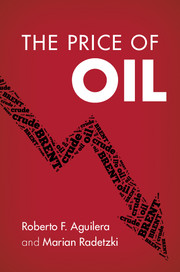Book contents
- Frontmatter
- Contents
- Figures
- Tables
- Acknowledgments
- 1 Introduction and overview
- PART I OIL'S EXTRAORDINARY PRICE HISTORY: HOW CAN IT BE EXPLAINED?
- 2 The price of oil since the early 1970s: observations and implications
- 3 OPEC and its behavior cannot explain oil's price performance
- 4 Can depletion and rising costs explain the price developments?
- 5 State ownership, government greed and the slowdown of capacity expansion
- 6 The resource curse and capacity destruction
- PART II THE SHALE AND CONVENTIONAL OIL REVOLUTIONS: LOW PRICES AHEAD
- PART III GLOBAL IMPLICATIONS FOR THE MACROECONOMY, THE ENVIRONMENT AND FOR POLITICS
- CONCLUSIONS
- References
- Index
5 - State ownership, government greed and the slowdown of capacity expansion
from PART I - OIL'S EXTRAORDINARY PRICE HISTORY: HOW CAN IT BE EXPLAINED?
Published online by Cambridge University Press: 05 November 2015
- Frontmatter
- Contents
- Figures
- Tables
- Acknowledgments
- 1 Introduction and overview
- PART I OIL'S EXTRAORDINARY PRICE HISTORY: HOW CAN IT BE EXPLAINED?
- 2 The price of oil since the early 1970s: observations and implications
- 3 OPEC and its behavior cannot explain oil's price performance
- 4 Can depletion and rising costs explain the price developments?
- 5 State ownership, government greed and the slowdown of capacity expansion
- 6 The resource curse and capacity destruction
- PART II THE SHALE AND CONVENTIONAL OIL REVOLUTIONS: LOW PRICES AHEAD
- PART III GLOBAL IMPLICATIONS FOR THE MACROECONOMY, THE ENVIRONMENT AND FOR POLITICS
- CONCLUSIONS
- References
- Index
Summary
In our quest to explain oil's historical price rise, the present chapter turns to the issue of state ownership. Though the private international oil companies consistently rank among the world's largest of any field in terms of market capitalization, revenues and profits, it is the state owned enterprises (often referred to as the national oil companies) that emerge as the true oil giants. The reason is well known: nearly all the world's oil reserves are under the control of the state owned firms.
The pages that follow capture the tumultuous history of nationalizations and privatizations, the ability (or inability) of the governments to run their oil industries, and the burdensome, often self-destructive fiscal regime that has been imposed on the state owned as well as private firms in the industry. We describe the issues thoroughly, often citing real world examples, in order to provide the understanding needed to explore their impacts on prices. Comparisons between the oil industry and that of metals and minerals yield fascinating additional insights. While it is tempting to jump to the conclusion that state enterprise shortcomings and overambitious fiscal extraction would emerge as the important factor behind the extraordinary oil price developments, our not so obvious conclusion is that much of the price rise remains to be explained.
THE WAVE OF NATIONALIZATIONS IN THE 1960S AND 1970s
Until 1960, the world oil industry outside the Socialist countries was almost entirely privately owned. The exceptions were Mexico, which nationalized its oil producers in 1938, and Iran, where the state took over as owner in 1951. Then, in the 1960s and 1970s, there followed a wave of nationalizations comprising Algeria, Iraq, Kuwait, Libya, Saudi Arabia and Venezuela among others (Marcel, 2006) so that by 1979, no less than 55 percent of non-Socialist world oil production had become government owned (Vernon, 1983). What happened in oil was not an isolated case. Similar waves occurred simultaneously in numerous non-fuel mineral industries, where the public share rose from insignificant numbers in the 1950s to reach 85 percent in copper mining, 71 percent in iron ore and 40 percent in bauxite out of a total non-Socialist world capacity by 1984 (Raw Materials Group, 2006).
- Type
- Chapter
- Information
- The Price of Oil , pp. 42 - 58Publisher: Cambridge University PressPrint publication year: 2015



